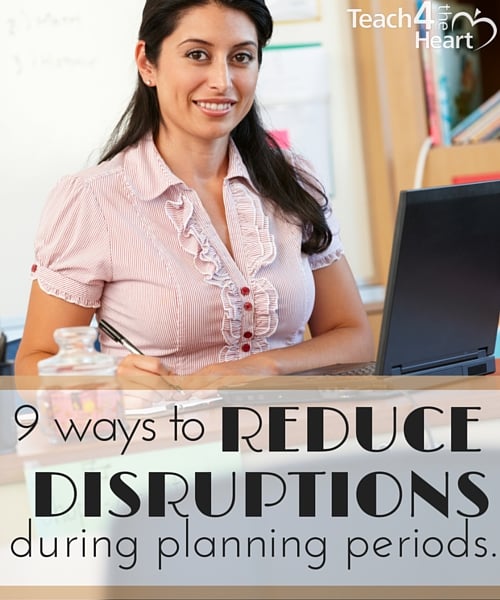Click here to find out more about the Teach 4 the Heart podcast.
Planning or prep periods are supposed to provide time for teachers to grade papers, plan lessons, and communicate with parents. But the sad reality is that these planning periods often are anything but.
You know how it is. You’ve been having a crazy day. The kids walk out the door & you sit down to finally get something done. You check your email & find a complaint from a parent. By the time you’re done dealing with the issue, your time is half done & you haven’t checked anything off you list yet. So you buckle down & get going when a student comes in to ask you a quick question.
Five minutes later you dive back in, only to be distracted by a funny text from your friend. You really needed a laugh. It’s been a tough day. So you smile, text back, and then get back to your papers. You grade the first one and ***Ding*** the bell rings & kids start pouring in.
You sigh and stand up. You felt like you were working the whole period but you pretty much got nothing done.
Sound familiar?
There are so many distractions that are just a natural part of teaching, but that doesn’t mean we can’t learn to create focused work times that allow us to actually get blocks of work done at school.
Not every planning period will be a focused work time, but you should be able to create at least a few of these per week. And before you say that’s impossible, let’s look at some specific ways to reduce the distractions & disruptions.
9 ways to reduce disruptions during planning periods
- Make appointments with yourself & guard that time. If you had an appointment to meet with a parent, you would respect that commitment & deny any other requests to meet with you during that time. Well the same thing should be true when you set appointments with yourself.
When you plan a dedicated work period and someone asks to stop by & talk with you, tell them you have a prior obligation. This is not a lie because you’ve made a prior obligation with yourself. You’ll be amazed at how good it feels to guard this time & your colleagues will have no problem stopping by later. - Don’t check your email. When you check your email, you’ll be distracted by everyone else’s request for your time. Instead, keep your email closed except for a designated time (or two) each day when you plan to reply to emails.
- Turn off your notifications. Notifications are crazy distracting, and turning them off is amazingly freeing. I keep notifications only for texts and Voxer. Everything else is off. I’ll check it when I want, but I don’t want it disrupting my day.
- Use airplane mode. If calls and texts are a big disruption for you, airplane mode allows you to declare yourself unavailable for a few minutes. And don’t worry – those texts will be there when you come back.
- Use an app like Freedom to block distractions. Apps like Freedom allow you to block different websites during focused work times. Perfect for those who have trouble staying away from social media.
- Shut your classroom door. And maybe even put up a sign that says something like “Teacher working. Please come back later.” You can’t do this every day, but when you need to get something done, it’s okay to tell people this isn’t a good time.
- Have designated times students can (and cannot) come ask you questions. If you’re bombarded with student questions during planning periods, you might want to plan this more strategically. Set certain times or days when students can ask you questions and explain that they need to respect your time & stick to these times. Or, teach them that when the sign is outside, they need to come back later. It’s actually healthy to draw these boundaries and be intentional about when you do and don’t answer student questions.
- Find a secluded spot to work. Sometimes to get something done you have to get out of your room. Is there a part of your building that no one goes to? Maybe camp out there for a bit. And if you have a large block of time, consider getting off campus. You might just be amazed how much you can get done in an hour at the library.
- Do “errands” at the end of the planning period instead of the beginning. If you need to run copies, stop by the office, or stop by the students, save those tasks for the end of the period, not the beginning. The reality that students are coming back soon will keep that 5 minute task from consuming 10, 15, 20 minutes – like it easily does it you do it at the start of the period.
Need more help getting things done and finding some balance? In Take Heart & Teach, you'll discover more practical tips just like these to help you teach with excellence, balance, and the joy of the Lord - even when things are crazy.

free training
For more help with your work/life balance, join us in our new free training: 5 Time-Saving Practices to Stop Feeling Overwhelmed. I firmly believe you can be an amazing teacher and do it in a reasonable amount of time. Let me show you HOW in this free training.


I like these ideas and wonder if they would be received well at my school. I think I might run them by my principal to see if we can offer these up to the teachers at the beginning of the school year.
Thanks!